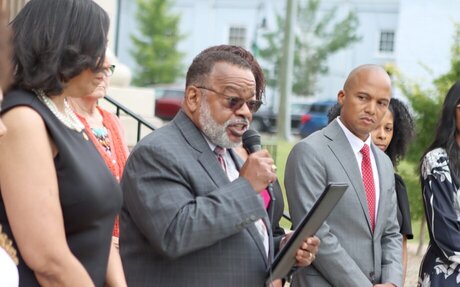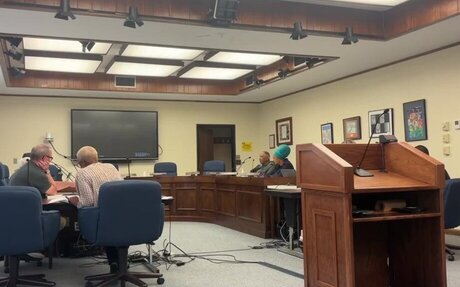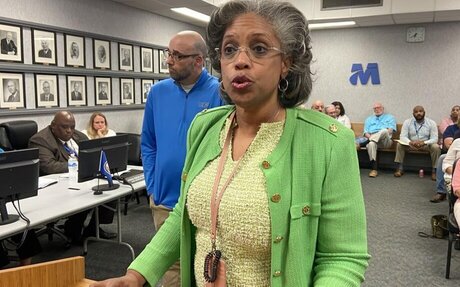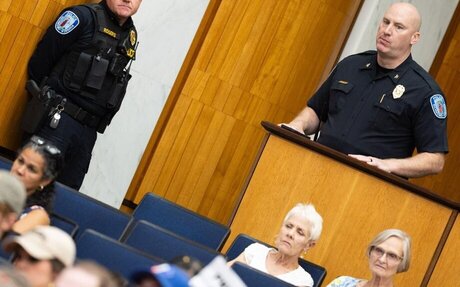|
|
0 8 . 0 7 . 2 5
All Access
5 items
|
|
|

|
State
The Virginia Court of Appeals determined Tuesday that the Virginia NAACP’s yearslong challenge to Gov. Glenn Youngkin over access to records concerning his administration’s changes to voting rights restorations can move forward. Because a previous ruling by a Richmond judge that sided with the governor never addressed the attorneys fees that had been part of NAACP’s lawsuit, the appellate court has decided the case is not closed. “We dismiss the premature appeal without prejudice and remand the matter to the trial court to consider the attorney fee issue,” the court’s judges wrote in a filing Tuesday. The Virginia Conference of the NAACP had originally filed a Freedom of Information Act request to the governor’s office seeking further details about how it handles restoration of voting rights to people with felony convictions who have completed their sentences.
Link to unpublished opinion (unpublished means that it does not hold precedential value): https://www.vacourts.gov/static/opinions/opncavwp/0264242.pdf
|
|
|

|
Higher ed
The University of Virginia might now have an interim president, but stability is still lacking on Grounds at the state’s flagship university. On Monday, UVa’s governing Board of Visitors appointed Paul Mahoney, a former Law School dean and current professor, to temporarily lead the school as the search begins for a more permanent replacement for former President Jim Ryan, who resigned in June under pressure from the Trump administration Department of Justice. Mahoney does not appear to be a point of contention. Rather, state officials, current and former faculty, students and alumni say they are frustrated by the secrecy shrouding his appointment and, before that, Ryan’s departure. The process of finding an interim president included listening sessions with UVa leadership, staff, faculty and students. A website where people with UVa credentials could submit nominations for an interim president collected just under 600 nominations for 143 individuals; five individuals received 30 or more nominations — but it is unclear if Mahoney was among those five. Those who participated in the listening sessions did so by “invitation only,” according to Professor Ian Mullins, and the board did not publicly disclose any of the feedback or who was involved.
|
|
|

|
Local
Lynchburg City Schools’ advocate Danny McCain resigned from the school board’s Ad Hoc Achievement Gap Committee, walking out of its Wednesday meeting. McCain said he felt that the committee was “just thrown together” because of what happened to him. McCain was banned from speaking at school board meetings after he went over his allotted time at the June 3 meeting, saying he would only sit down after the school board agreed to meet with him to discuss the achievement gap between Black and white students in Lynchburg. The school board later rescinded its motion to ban McCain after he agreed not to disrupt future meetings.
|
|
|

|
Local
Martinsville City Manager Aretha Ferrell-Benavides, on paid administrative leave, is actively seeking other employment, while defending herself against what she describes as “unofficial allegations and mischaracterizations.” Meanwhile, the City Council published a notice Tuesday of a special-called closed meeting at 5 p.m. Thursday regarding “the city attorney and city manager positions, contracts, and performances.” Initially declining to comment, Ferrell-Benavides spoke at length about her embattled tenure in Martinsville and provided the Bulletin with over sixty pages of documentation and material supporting her belief that she was targeted and blamed for a breakdown within her administration, amidst a splintering of the city council, which began with a falling-out between Mayor LC Jones and Councilman Aaron Rawls.
|
|
|

|
Local
More than five years since Richmond’s City Council voted to convene a task force to establish a civilian review board for the Richmond Police Department, that board has yet to get off the ground — and still doesn’t have any policies or members. During a July 7 meeting, City Council continued legislation that would codify policies and procedures for the board for the second time since Councilwoman Reva Trammell introduced it in May. It’s the body’s second attempt at getting the critical ordinance passed; Trammell introduced a similar ordinance in January but later withdrew it….As a starting point, the board under Trammell’s proposed policies will be entitled to redacted police reports and citizen complaints, internal affairs summaries and body-worn camera footage within five days of asking for it. And the members will be given access in closed sessions to some categories of files that are exempt from Virginia’s Freedom of Information Act — such as records that contain confidential source information or would reveal investigative tactics.
|
|
|
|
|
|
|
|
|